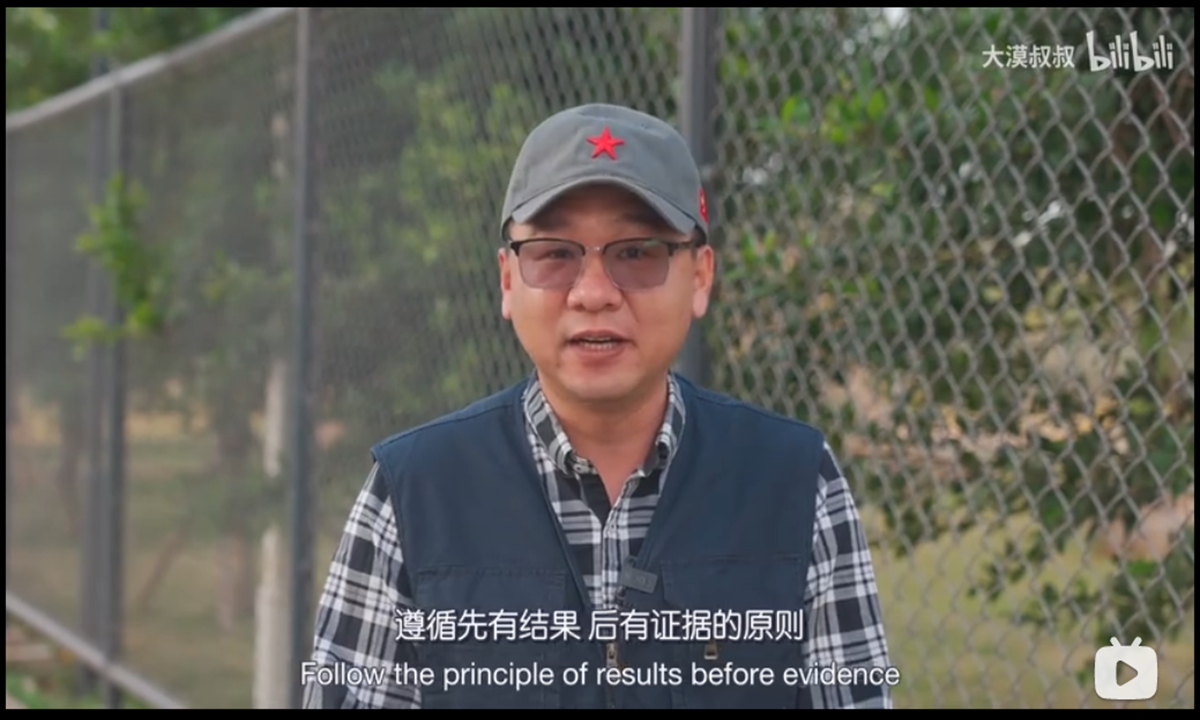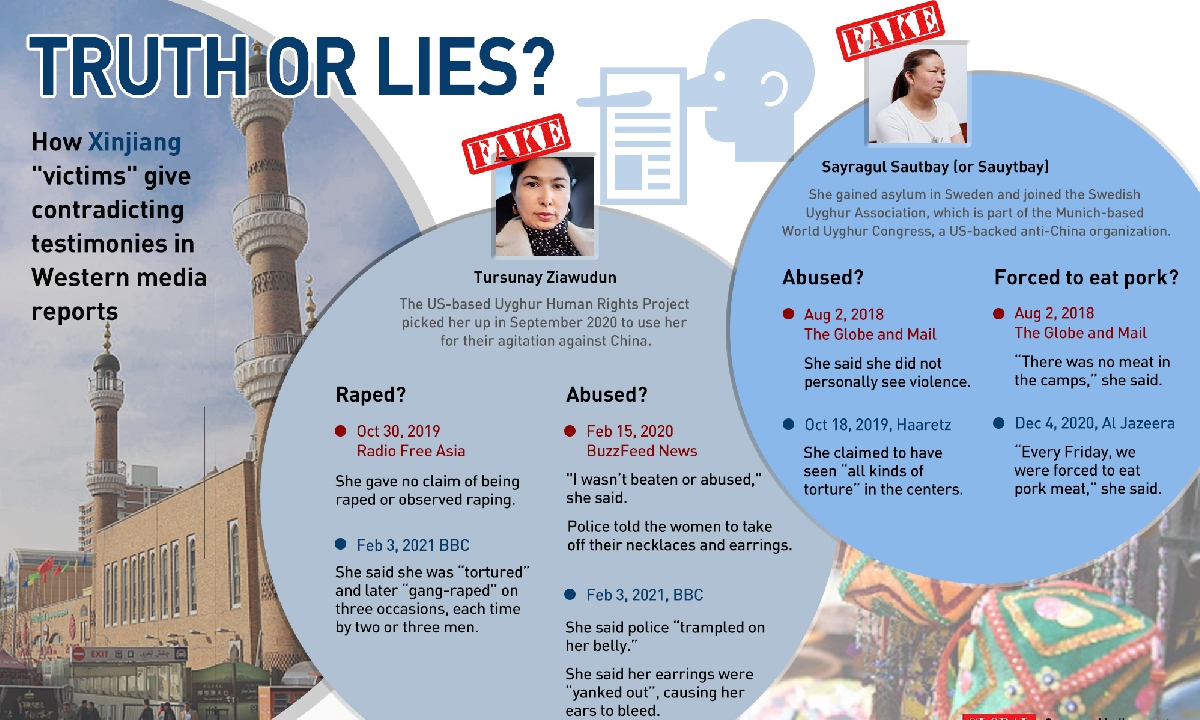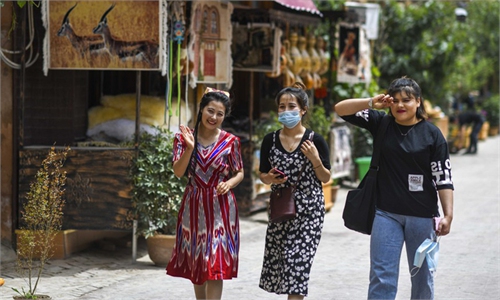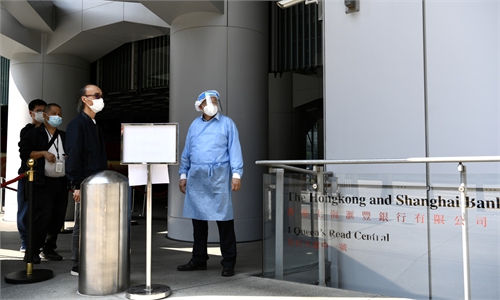IN-DEPTH / IN-DEPTH
Chinese and foreign nationals, fed up with West’s slanders, take to the internet to set things straight
People’s information war

Screenshot of an Uncle Damo video production in which he reveals the BBC's slanderous tactics when reporting on China
A growing number of Chinese individuals, angry with Western media outlets' frequent attacks on China, are standing up to fight against the Western media's propaganda war, especially their baseless smear campaign on China's COVID-19 response and internal affairs involving Hong Kong and Xinjiang.Several residents in Northwest China's Xinjiang Uygur Autonomous Region plan to sue the BBC for making fake news pieces and spreading rumors about Xinjiang, a senior official from the region recently said.
"The BBC constantly crossed the line in Xinjiang-related reports and completely abandoned the professional ethics expected of the news media," Xu Guixiang, deputy director of the publicity department of the Communist Party of China (CPC) Xinjiang Uygur Autonomous Region Committee, said at a press conference on March 18.
Chinese people have long been discontented with some biased Western media outlets like BBC. A satirical video with the hashtag "how to be a good BBC reporter" went viral on social media recently. In the video, a Chinese man jokes that he wants to apply for a job at BBC, and he demonstrates some shooting, interviewing and post-producing tricks BBC used to distort China-related coverage.
This video has more than 10 million views on overseas and domestic video platforms including YouTube and Bilibili, with numerous netizens applauding it for exposing the skewed and unprofessional reporting of renowned Western media on China.
It ends with the sentence "(cameras) are used to record the world; some people use them to get rid of the panic. I want to expose to the public the lies and scams they've made in reporting on China," the video's maker, Chinese vlogger Uncle Damo, told the Global Times.
Uncle Damo is one of the individuals who voluntarily fight against the Western media's misinformation and slander against China. Their efforts are equally important to the Chinese government's work in countering the Western media's sustained anti-China onslaught, said Professor Zhang Weiwei, director of the China Institute at Fudan University in Shanghai. "This is the voice from the people against what they perceive as baseless accusations against China," he noted.
"The 'war' belongs to not only foreign ministry officials but also the general public," Zhang told the Global Times. "The people have boundless wisdom."
Spontaneous moves
Scholars in international relations and communication reached by the Global Times describe the spontaneous moves of individuals refuting China-related rumors by the Western media on the internet as a "people's war."
"People's war," a military strategy of Chairman Mao Zedong, was once used in China in fighting against foreign invaders, such as the Japanese army during World War II. "As Chairman Mao said, '…the common people throughout the country will create a vast sea in which to drown the enemy,'" Zhang told the Global Times.
Uncle Damo, with 2.76 million and 460,000 followers on Bilibili and Sina Weibo respectively, said he used to be a documentary and news video maker. As a former journalism industry insider, he found many wrongdoings or intentional tricks in the coverage of China by mainstream Western media outlets like BBC and CNN, such as adding grayish "underworld filters" to the videos, misusing inappropriate materials, and asking deciptive questions.
Uncle Damo simultaneously published two videos targeting BBC and CNN in February to reveal their tricks, which soon attracted widespread attention among netizens and even set off an upsurge of people taunting Western media through making similar videos with hashtags like "imitate BBC" or "BBC-style." "Within days we have seen more than several thousand videos of that kind," Uncle Damo told the Global Times.
Western media's defamation against China has misled some foreign readers, who have therefore misunderstood and even discriminated against the overseas Chinese community.
To clear up these misunderstandings, INSIGHT, a Beijing-based group that mainly provides study and living information for Chinese students in the US, has published dozens of articles that refute the Western media's slanderous accusations on its WeChat account, which has some 2 million subscribers.
An INSIGHT content editor surnamed Zhang told the Global Times that on the ongoing countering of China-related non-objective reports on Western media outlets, she and other editors will organize a meeting to discuss whether they can write articles to refute untrue claims, especially from the perspective of overseas Chinese students - their main readers.
The American magazine TIME, for instance, published an article titled How China Could Change the World by Taking Meat Off the Menu on January 22, drawing an awkward connection between Chinese meat consumption and global environmental problems.
Three days later, INSIGHT published an article that revealed the meat consumption per person in the US was 90.1 kilograms in 2014, about 30 kilograms more than that in China in 2020.
The article also vividly pointed out the electricity wastage problem at some US campuses. They quoted a few Chinese students in New Orleans, Davis, and Miami who said they feel like they are "freezing" in summers and even have to resort to applying for heaters in dorm rooms because their air conditioners are "always set to 16-22 degrees."
"We want to tell the truth, and to show our overseas Chinese readers that they can fight back bravely when coming across misrepresentation or discrimination," Zhang noted.
Some foreigners also voluntarily take part in fighting against Western media's biased coverage against China. Angelo Giuliano, a Hong Kong affairs observer from Switzerland, has been refuting Hong Kong-related rumors from Western media outlets on Facebook and Twitter for months together with several other foreigners.
Giuliano said he decided to join in on the "campaign" in 2019 after he saw a Global Times journalist being tied up and beaten by rioters at the Hong Kong airport. "I was shocked by the fact that no one was trying to free him," Giuliano recalled.
While living in Hong Kong, Giuliano also saw the news reported [by Western media] about the protests in this city in 2019 and how they were "completely the opposite of the reality." "So I decided to speak out," he told the Global Times. "I didn't want Hong Kong to be used by the West to create another Syria or Libya."
Giuliano updates his Twitter account almost every day, clarifying and criticizing false reports by the Western media on Hong Kong, Tibet, and the latest on Chinese people in Myanmar. On Facebook, Giuliano and his friends created a private forum named Save HK, where they share facts and evidence that they gathered to disprove misinformation.
Giuliano said he wants to present the world with the other side of the story amid the Western media's propaganda war against China. "It is critical," he noted.

Truth or lies? How Xinjiang "victims" give contradicting testimonies in Western media reports. Graphic: GT
Increasing volunteersGiuliano shared with the Global Times some tricks used by the Western media in reporting about the Hong Kong riots.
"They start with the wording," he said. "By using words like 'peaceful protestors,' 'democracy' and 'freedom,' they already put the 'good' and the 'evil' into boxes. Western propaganda is very sophisticated and has a long experience in manipulation."
In terms of camera language, Western media outlets like BBC and CNN also played many dirty tricks in their documentaries or news videos, said Uncle Damo. "They like to create a depressing atmosphere with elements like walls, iron railings, and barbed wire; they like to show extreme close-ups of Chinese officials' faces to make them look hideous; they like to use dusty and hazy filters and oblique shooting angles to show China is 'dirty' and 'out-of-order'…" he exampled.
Western media's slander against China seemingly peaked in 2020 amid the COVID-19 pandemic, according to some anti-Western-rumor individuals reached by the Global Times. "I felt very uncomfortable seeing them characterize COVID-19 as the 'Chinese virus' or the 'Wuhan virus,' and maliciously shooting in mortuaries in Wuhan time and again," Uncle Damo said.
When the Wall Street Journal described China as "the real sick man of Asia" in an article in February 2020, INSIGHT editors were enraged, Zhang recalled.
Zhang and her colleagues soon invited some overseas Chinese students to expose some of the discrimination they had experienced amid the pandemic, and shared their stories on WeChat and other foreign platforms including YouTube, Twitter, and Facebook to advocate for "Fight the virus, not Chinese."
On social media, it's common to see Chinese users condemn and taunt the ugly performances of the Western media in attacking China. They mock the BBC as the "Biased Broadcasting Corporation," and scoff at CNN with the internet catchphrase "Don't be too CNN-like!"
Many Western media outlets, with their gratuitous hostility against China, have lost their so-called journalistic professionalism that they have long been flaunting, Zhang Weiwei said.
"Many Chinese people once regarded outlets like BBC and CNN as professional, 'high-level' media agencies and read their stories to learn English; but now they don't believe them anymore," he told the Global Times.
The number of individuals who voluntarily involve themselves in refuting the Western media's rumors, accordingly, will continue growing, predicted Zhu Wei, a communications researcher at the China University of Political Science and Law in Beijing.
"Current readers and audiences not only learn and understand the world through media but also by their own eyes and experience," Zhu told the Global Times. "In the We-media era, every citizen can share online the truth they personally experience, to reveal the Western media's double standards and to be heard by a large number of netizens."
Being attacked
Nongovernmental power is very important in fighting against the Western propaganda that targets China, as many foreign readers, influenced by the defamation by separatists against Chinese authority, tend to ignore the Chinese government's clarifications or refutations on rumors, Uncle Damo said.
Nonetheless, including Uncle Damo, many individual "fighters" told the Global Times that they have been attacked by anti-China forces since exposing the Western media's slander campaigns against China. Their articles and videos were blocked, removed by foreign platforms, and some of them even faced personal threats.
Uncle Damo said that YouTube has removed at least "five or six" of his videos that refute China-related rumors or show the crimes by some rumormongers. "YouTube gave me a yellow-card warning, saying I 'hurt religious freedom' or 'hurt the feelings of other media,'" he recalled.
Giuliano even received death threats among other vicious attacks. "They exposed pictures of my 3-year-old son," he said. "This was quite sick."
Giuliano talked about the "shadow banning" of platforms including Twitter and YouTube that intentionally control the spread of information.
When posting article links from Chinese media like the Global Times or CGTN, "the algorithm changes the exposure so our posts have limited impact," he sighed. "I continue to tweet to tell the world about the reality, but we are being silenced gradually. Our accounts are being manipulated and it is only a matter of time for us to be completely silenced."
Anti-China forces usually label individuals like Giuliano and Uncle Damo as "wumao (50-cent party)," saying they are Chinese government-sponsored internet commentators who "manipulate public opinion" and "disseminate disinformation" to the benefit of Chinese authorities.
All these individuals reached by the Global Times noted that their fighting against the Western media's rumors is purely voluntary. "I would be a millionaire if the Communist Party of China was paying me 50 cents per tweet," Giuliano joked. He was labeled "wumao" or "Tankie" by anti-China forces.
Uncle Damo, who was occasionally called a "spokesperson" for the Chinese government, said that he'd never gotten a penny from the government for his videos. "Instead of smearing China or labeling us, I suggest Western media outlets change their mindset in covering China," he noted. "I don't expect them to praise China, but they should at least objectively report on China.




